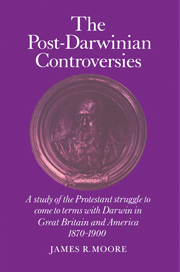 The Post-Darwinian Controversies
The Post-Darwinian Controversies Book contents
- Frontmatter
- Contents
- Dedication
- Preface
- PREFACE TO THE PAPERBACK IMPRESSION
- Introduction: the terrain of revision
- PART I HISTORIANS AND HISTORIOGRAPHY
- PART II DARWINISM AND EVOLUTIONARY THOUGHT
- PART III THEOLOGY AND EVOLUTION
- Conclusion: on coming to terms with Darwin
- Dedication
- Notes to the text
- Bibliography
- Index
Conclusion: on coming to terms with Darwin
Published online by Cambridge University Press: 22 January 2010
- Frontmatter
- Contents
- Dedication
- Preface
- PREFACE TO THE PAPERBACK IMPRESSION
- Introduction: the terrain of revision
- PART I HISTORIANS AND HISTORIOGRAPHY
- PART II DARWINISM AND EVOLUTIONARY THOUGHT
- PART III THEOLOGY AND EVOLUTION
- Conclusion: on coming to terms with Darwin
- Dedication
- Notes to the text
- Bibliography
- Index
Summary
It has been a matter of controversy…whether evolutionary theory demonstrates the need for a new religion to include the new idea of an evolving Universe or whether nothing more is needed than a transformed – or for the first time clearly understood – Christianity.
John PassmoreDarwin's theological perplexity and his eventual uneasy agnosticism might be better construed as evidence of the incompleteness of his work than as proof of its essential heterodoxy. Such at any rate is an interpretation which Darwinian commentators, old and new, would seem to allow. Huxley thought that evolution by natural selection is ‘neither Anti-theistic nor Theistic’, that ‘it simply has no more to do with Theism than the first book of Euclid has’. Chauncey Wright argued forcefully for the metaphysical ‘neutrality’ of the theory. David Hull has remarked that ‘the development of evolutionary theory since Darwin might well be described as a scientific theory in search of a metaphysics’. And in his Providence Lost Richard Spilsbury has written of contemporary Neo-Darwinians in much the same vein in which Geoffrey Wells wrote of Darwin forty years ago. ‘The fragmentary man’, said Wells, ‘can only manifest a fragmentary truth’. Darwin was ‘a specialist getting on with his job, in a sociological, political, and religious vacuum’. He was ‘incomplete’, and ‘Darwinism accordingly inadequate as a philosophy by which men may live’.
Of course Darwinism has never been held in a ‘vacuum’, apart from ultimate beliefs, nor has it ever been purged of its metaphysical susceptibilities.
- Type
- Chapter
- Information
- The Post-Darwinian ControversiesA Study of the Protestant Struggle to Come to Terms with Darwin in Great Britain and America, 1870-1900, pp. 346 - 351Publisher: Cambridge University PressPrint publication year: 1979


